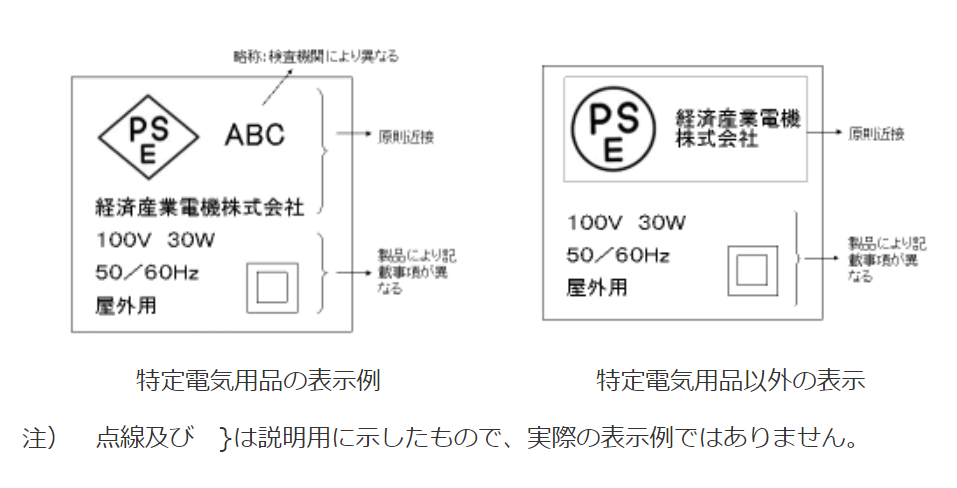[Certification Q&A (12)] We will answer mainly your concerns about PSE DC power supply (AC adapter)

Hello. It is the moat of the caretaker.
Basically, we do not propose useless authentication to customers, but even so, there are many times when customers ask, "Is there any exception provision that does not require authentication?"
Unfortunately, however, it is more standard that there is no exception provision such as "It is okay not to certify" in authentication, and most of the applicable certifications are implemented in some form, such as PSE and PSC designated by the Ministry of Economy, Trade and Industry, and Radio Law designated by the Ministry of Internal Affairs and Communications.
While it is a major premise to authenticate in this way, for example, this PSE can assume two patterns, and there are an increasing number of cases where we give judgment that which pattern should be authenticated with and that it can be done cheaply.
In particular, there are many patterns that use a DC power supply (AC adapter) of a specific electrical appliance item, and as I have told you several times on this page, there is a possibility that the AC adapter can be used for PSE procedures at a relatively low cost compared to using a certain method.
For example, if the product you are inquiring about uses a DC power supply device (AC adapter), certification of the product itself is not required, and it may be completed only by completing the procedures for AC adapter: specified electrical appliances.
However, on the other hand, depending on the product content, although the AC adapter is used, the product itself may need to be certified with a specific electrical appliance and material other than the adapter.
In that case, the certification fee will also be a little more expensive.
However, this is not something that we decide on our own, and after confirming with the Ministry of Economy, Trade and Industry, etc., we will report it as a necessary formal procedure.
It is the Ministry of Economy, Trade and Industry that ultimately determines whether or not there is PSE certification, and our image is that we provide prior knowledge to customers based on our past experience.
This time too, I will write mainly about our case study, but basically all certifications are made to order, so it is necessary to confirm appropriately for each individual product.
Contents
- 1 Is the mobile battery charged with the AC adapter PSE?
- 2 Was it true that the direct tube TYPE LED light using the AC adapter was said to be other than PSE specified electrical appliances?
- 3 Do I use an AC adapter to supply power in radio law products, do I need a PSE?
- 4 Is it PSE eligible for use at unveiling parties?
- 5 Is it okay to display the PSE mark itself with the product logo because it is cool?
Is the mobile battery charged with the AC adapter PSE?
In conclusion, if a mobile battery (lithium-ion battery) is "built-in", it can be judged that it is not subject to PSE (other than specified electrical appliances).
However, if it can be freely removed as an "external" mobile battery, the battery itself is also PSE targeted, and the AC adapter is also PSE targeted.
Recently, there have been many such inquiries, for example, if a mobile battery is built into the product body with a vacuum cleaner, the AC adapter is used to charge the lithium-ion battery of the product body, but the PSE required at that time is only the AC adapter.
But by design (design?) Perhaps because of the problem, the number of products that externalize mobile batteries is increasing, mainly imported products. Then, the mobile battery will be subject to PSE.
In foreign countries, regulations may not change much with the internal and external components of mobile batteries, but in Japan, it is a big question whether PSE is generated by it. For small businesses thinking about importing, it is quite a headache considering the cost of certification and the time and effort required to arrange it.
In addition, the reason why external batteries are subject to PSE is based on the fact that external batteries can be used with other products other than the main unit sold together.
The same is true for the same product from the same manufacturer.
For example, if there is exactly the same vacuum cleaner B and C released by manufacturer A, at the point when the external battery of B can be used for C as it is, that battery will be regarded as a mobile battery targeted at PSE.
Of course, it is better to use it as an external battery, because you can prepare a spare battery, so it will be convenient when you use it for a long time such as outdoors. In fact, there are customers who are certified for such applications.
However, for those who want to reduce the authentication cost as much as possible and save extra trouble, this external battery is a matter of life and death.
There are some countermeasures, but it is unclear whether they can be applied to all products, and this is also a case-by-case basis, so if you are worried about this, please contact us.
Was it true that the direct tube TYPE LED light using the AC adapter was said to be other than PSE specified electrical appliances?
In a previous Q&A(11) article
By the way, ac type (direct tube type) LED stand (direct tube type) of AC type (power outlet extends directly from the product) falls under the same category No. 290 "desk lamp" (other than specified electrical appliances), so please be careful.
(omission)
On the other hand, products that use DC power supplies (adapters) that have a lamp input current of DC (DC) (no lamp control device for AC/DC conversion) are not eligible for PSE. The adapter itself requires PSE.
I write, but I would like to supplement it a little more.
For example, if it is easy to attach, remove, or remove the electric light fixture (not the LED itself but the apparatus for emitting LEDs) connected to the terminal of the AC adapter, a PSE (specified electrical appliance) of the AC adapter is required.
On the other hand, if it is not easy to attach, remove, or remove such as the adapter and the electric light fixture, there is a possibility that it corresponds to the above "desk lamp".
Then, since the judgment which is easy and is not easy becomes a case-by-case, consultation for each individual product is necessary. In general, it is judged that it is easy to attach and detach those connected by terminals or USB, etc., but just in case, please remember the above provisions.
Then, as for the question, I do not know how familiar the trader who has said that is familiar with PSE, but for the time being, please check the connection between the adapter and the LED light body.
Do I use an AC adapter to supply power in radio law products, do I need a PSE?
This is a little off topic from this time, but this is also a question that has been a lot lately, so I will answer it.
Basically, even on the same product, the Radio Law and PSE are completely different.
So, just because we have obtained Radio Law certification, it does not mean that PSE will be exempted. Even a single product must meet all of the necessary certifications, if any.
However, one hint can be said that, for example, there are many Radio Law products with a high unit price per unit, and most of them do not purchase in large quantities, but want to introduce them experimentally from about 100 units first.
Then, assuming that Radio Law certification will be done, it is also possible to procure and use Japan PSE acquired adapter sold in Japan for the adapter.
Considering the cost of PSE procedures, etc., domestic procurement will be faster and cheaper if it is about 100 units.
Therefore, our company is a radio wave law terminal, and when using an AC adapter for power supply, there are two ways of PSE procedure, overseas procurement and domestic procurement, and we have the customer judge after explaining.
Is it PSE eligible for use at unveiling parties?
From here, it will be a little far from the AC adapter.
As I have introduced several times, the PSE Act (Electrical Appliance and Material Safety Act) stipulated by the Ministry of Economy, Trade and Industry has the following articles.
A person who sells or displays electrical appliances for the purpose of sale in violation of article 27, paragraph 1 of the Act will be subject to imprisonment with work for not more than one year or a fine of not more than 1 million yen or both.
In short, if you perform a PSE inspection without delay, apply for a business or import notification to the Ministry of Economy, Trade and Industry, display the PSE correctly and not be a product, you will not only sell it at the store, but will be subject to penalties even if you display it for the purpose of sales.
Here, there is a problem of legal interpretation, but the "display for sales purposes" in the text widely means sales activities, and it is also applicable to have them used at product announcements etc. rather than just selling at stores.
Certainly, if you say that an accident will not occur while you are using it at the product unveiling party etc., it is not so.
On the other hand, if you do not have customers use it at a mere exhibition, and you are really exhibiting, you have received the opinion directly from the Ministry of Economy, Trade and Industry that it is not a problem if you display "This product itself cannot be sold".
In short, regulations will also change depending on the content of the trade fairs to be exhibited and the way we exhibit our products. The best part is that all the PSPE inspections are completed before the trade fair, but if it is difficult by all means, please proceed with the story while checking with the Ministry of Economy, Trade and Industry.
Is it okay to display the PSE mark itself with the product logo because it is cool?
Let's not do it from the conclusion.
Please take a look at the product logo before! When you look at it from the customer, both diamond-shaped PSE and round PSE were displayed along with the logo.
The moment I saw it, I was quite surprised, but as a customer, the PSE mark itself is cool, and if you display it with the product logo, you can appeal the high safety of the product, so I devised it.
I gave a high money and performed PSE certification, so I understand the feeling of wanting to appeal it, but as a basic idea,
(1) The PSE display displays product internal information such as the operating voltage together.
(2) Displaying the PSE mark in a place unrelated to (1) may be subject to penalties
(3) All electrical products allowed to appear on the market are obligated to display the PSE mark, and the relevant product has a display and is natural, so it should not be appealed basically
There is a thing.
By the way, since this customer's product is a diamond PSI, regardless of round PSE, it is more confusing to display it at last, so I told them not to display it around the logo.
PSE often conducts various investigations such as confirmation of inspection costs and inspection periods, but I think that it is quite difficult to confirm the peripheral information of such laws for those who have little experience in certification.
In addition, in the process of proceeding with the confirmation, there is a possibility that omissions will inevitably come out.
In addition to PSE, we also provide consultation on other certifications, so if you have any questions, please do not hesitate to contact us.
 Citation:
Citation: 
